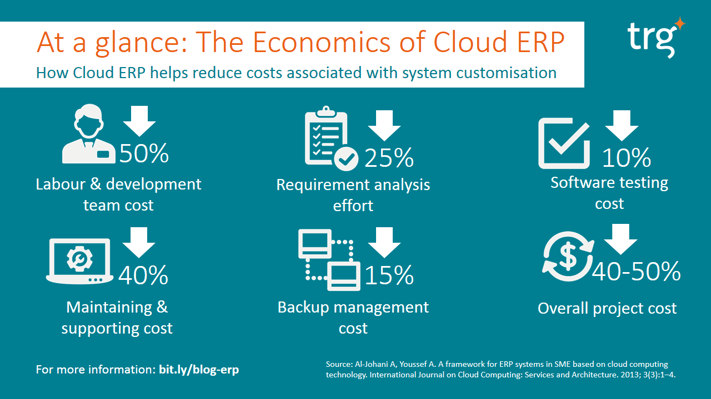To cloud, or not to cloud, that is the question. For enterprise applications, “cloud” is no longer a buzzword but increasingly becoming a prominent trend. Businesses can achieve significant advantages over other legacy on-premise solutions, which are locally installed on companies’ servers and computers, with ERP software in the cloud.

Why choose cloud-based ERP solutions?
Lower and more manageable TCO
The Total Cost of Ownership (TCO) for cloud-based ERP systems is normally lower than for on-premise systems. Vendors of on-premise systems usually charge their clients a hefty up-front licence fee, plus annual fees for ongoing maintenance and periodic updates. On top of that, you have to invest in the necessary hardware and facilities to run the systems. More important, you must continuously spend a significant amount of time and budget to maintain a competent IT team to ensure the ERP system is running effectively.
Read more: 7 Key Benefits of Adopting Cloud Computing in the Enterprise
Conversely, cloud-based ERP solutions require less investment because you do not need to build and maintain the infrastructure services, which are provided by the ERP vendors. Additionally, your IT resources can be spent on innovating rather than maintaining and managing your on-premise systems. Forrester and Gartner's studies suggested that 50% to 90% of a typical IT budget is spent on maintenance rather than innovation.
Cloud ERP offers a much clearer and more predictable subscription-based monthly or annual fee compared with the intricate model of on-premise licences. This subscription-based model is easier to understand and break down, ensures a smoother cash flow, and helps facilitate planning and budgeting.
Video: Cloud ERP for F&B: A success story of JR Watkins
Faster deployment & better scalability
Instead of having to spend time and money to procure and install the necessary infrastructure, you simply configure the software to your requirement and access it through web browsers. In fact, cloud-based ERP solutions could potentially reduce the deployment time to just 25% of the amount it takes to deploy a legacy on-premise ERP system.
Read more: Cloud ERP for Garment Manufacturing: a Success Story of TAL Apparel
Because the vendor handles the IT infrastructure, you have more freedom to scale as your business grows. There is no cumbersome hardware investment needed if you want to allow more employees to access the system. And because the system is run through an internet connection, it can be expanded to multiple locations much more easily than on-premise systems.

Latest innovations and technologies
Because legacy on-premise ERP systems take significant time to deploy and are not easy to scale, companies are more reluctant to upgrade their systems. In fact, according to research conducted by Forrester, “approximately half of ERP customers are on releases that are two versions behind the current release, which may be four years old or more.” Such ageing legacy systems are unlikely to deliver any sustained value and competitive advantage to your business, and could potentially drain your much-needed resources.
On the other hand, the much more agile internet-based cloud ERP systems are continually upgraded by the vendors. Product upgrades or enhancements are deployed effortlessly to your systems. Therefore, you can always benefit from the latest technologies.
Even though there are still some concerns regarding the trend toward cloud implementation, such as security and compatibility with legacy systems, cloud-based ERP is here to stay.
 English
English  Vietnamese
Vietnamese 

